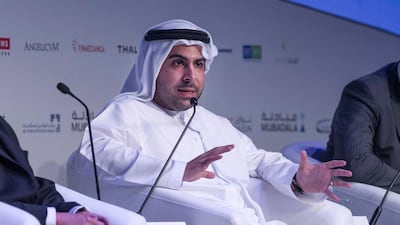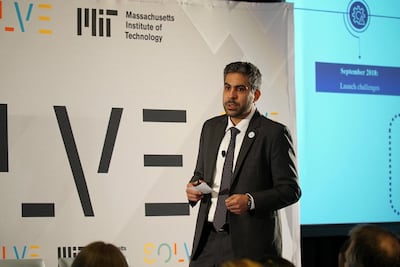For Badr Al Olama, critics of globalisation could be better won over with a simplified argument that shows how countries benefit more from open trade than from protectionism.
As the chairman of the Organising Committee for the UN-backed Global Manufacturing & Industrialisation Summit (GMIS), he has a leading role in moulding the future of manufacturing, both in the UAE and internationally, and envisions a more borderless, digitally-driven world.
“The common mistake that is made is to assume that manufacturing is country A versus country B. In reality, it is a supply chain, [with] country A plus B plus C versus D plus E plus F,” he says.
Mr Al Olama also heads up Aerospace and Defence at Mubadala Investment Company; aircraft parts manufacturer Strata is a subsidiary where he is also chairman.
It is his training as a lawyer, however, that gives him insight into how the messaging could be improved to demonstrate that consumers ultimately pay the price when free trade is curbed.
“You have to bring [the critics of globalisation] into the debate and you have to find an easier and simpler [way] … as lawyers, we take the most complex of situations and simplify it to be able to explain it to someone else... [and] say net-net you are better off with globalisation as opposed to being worse off as a country. You have to find simpler ways of explaining these concepts,” says the Harvard Law School graduate.
Energetic, well-spoken and erudite, Mr Al Olama’s various portfolios related to manufacturing and industry have given him a solid grasp of events, locally and internationally, and how they might affect the opportunities and obstacles to the growth of the country’s non-oil economy, which brings jobs and prosperity to the UAE.
Tensions between China and the US have boiled over in recent weeks, with the arrest of Meng Wanzhou, the chief financial officer of technology company Huawei, in Canada at Washington's request, becoming a potential bargaining chip in President Donald Trump's efforts to pressure Beijing to agree to a trade deal between to the two nations.
Mr Trump believes that China has been unfairly competing with American businesses, costing its economy jobs, and wants to address the trade imbalance.
“The question is, did the US lose jobs because of China or because of increased automation? [If] using robotics and using elements of the Fourth Industrial Revolution whether it was AI or algorithms or software, led to that job reduction?” Asks Mr Al Olama, who is also a member of the UAE Ministerial Council on the Fourth Industrial Revolution.
He does not believe China or any other trade partner can take the blame as Mr Trump says they should. Mr Al Olama says instead, that the Asian nation is becoming a serious threat to US economic hegemony from its efforts to build up its technological know-how – whether fairly and unfairly. It is also the sheer scale of Chinese talent that presents a formidable challenge to its competitors.
“One per cent of the top Emiratis to be hired as engineers is a very different [scale] from the top one per cent of the Chinese population hired as engineers. You can’t compete. But if you start investing in artificial intelligence and you start developing algorithms that are able to support you in competing, then it is a different conversation all together. That is why it is so important for the UAE to capitalise on [technological trends],” Mr Al Olama says.
His understanding of how developing industry capabilities could help accelerate the aims of the UAE has been shaped through his involvement in GMIS, which held its first forum in Abu Dhabi in March last year. The aim of GMIS is to support progress towards the UN’s Sustainable Development Goals through industry and manufacturing.
“The first phase [of GMIS] was to bring the governments, private sector and civil society together because everybody had a different impression of what they wanted,” he says.
At the next summit in Russia next summer, the hope is that both youth and nature-inspired technology can take centre stage.
The sharing of information and points of view on the future of manufacturing has also resulted in the creation of the Mohammad bin Rashid Initiative for Global Prosperity, aimed at promoting social innovation for global good, Mr Al Olama says.
Its Global Maker Challenge is an online and open platform, currently in its first cycle, for innovators to solve real problems in the world like food security in rural areas and equitable access to electricity.
“With the Fourth Industrial Revolution [comes] dis-aggregation of manufacturing. Anybody can set up a 3D printer and start adding value, anybody can start developing algorithms and add value,” he says.
“SMEs can step up and it becomes who is smarter wins, as opposed to who is bigger wins. The danger then is being swallowed up by a bigger manufacturer like Siemens or GE.”
Space has become one of the most exciting industries, with Virgin Galactic's landmark manned spaceflight last week, bringing the commercialisation of the sector a step closer. The UAE has been able to accelerate its manufacturing capabilities and KhalifaSat, the first entirely Emirati-made satellite, was successfully launched in October.
“It is about trying to get the spin-offs out of that … A lot of people don’t know that space tourism has an opportunity for science to also be developed by having R&D projects put as cargo on all those launches,” he says.
Advancing space exploration will help other industries “100 per cent”, he says.
“When you talk about smart cities, they are highly dependent on connectivity. What if that connectivity is not available through a telecom tower? It should be made available by a nanosat. If costs are driven down and you could 3D print them and you could launch them cheaply, then you don’t need telecom towers. You could connect everything through nanosats.”
Another important conversation being had at the moment is about sustainable industrial development and what Mr Al Olama calls "circular economies" – reusing and recycling every step of the process to end up with a manufactured product.
The key, he says, is including sustainable practices throughout the manufacturing process and not adding sustainable practices in as an afterthought. The shift to cleaner energy sources, as demanded by the Paris climate change agreement and one of the UN’s Sustainable Development Goals, will require a level playing field, he says.
“First of all, the world has to agree that, on a basis of competition, that there is going to be legislation that is enforced on everyone. There is no point in enforcing it in Western countries if there are parts of the world that are going to cheat. Sadly enough, they are going to do it if the legislation is weak and then you end up in a situation where you are saying ‘on the one hand you are holding me accountable and on the other hand other people are getting away with it’.”
There is good news for the future, he says, because action on sustainability and climate change is driven as much by young people as corporations or governments.
“The millennial generation want to know that the company they are working for is socially responsible, they want to know that they don’t have gender bias in their factory floors, they want to know they are at the same time doing something that’s valuable but they’re not destroying it for the future generations that’s coming after them,” says Mr Al Olama.
________________
Read more:
Former prime minister of Australia calls for stronger leadership from G20
Wef sets tone with inclusive message of Globalisation 4.0 theme for annual meeting
Economics 101: World security begins with free world trade
________________
This leads to the question of where global leadership is coming from today and if it can still come through multi-lateral institutions like the United Nations. Amid negative perceptions as a result of rising populism and nationalism in the Americas, Europe and Asia, some developed countries, including France, have withdrawn from bodies such as the United Nations Industrial Development Organisation (Unido) in recent years.
“Let’s talk about developed countries that are backing off Unido, because you have both [scenarios]. You have Japan, for example, that is in Unido and you have countries like France, the US and the UK that are outside Unido,” says Mr Al Olama. Currently, the agency has 168 member states and he makes the case for its continued relevance today.
“What do you want Unido for? Countries that have backed off said ‘I don’t need Unido to pass on industrialised contributions, donations to other parts of the world. I can do it myself’. In the case of the US, you have USAID. Others do not have the capability, such as the UAE, which can’t export industrialised capacity building to parts of Africa, because they don’t have the infrastructure there. Unido does.”
Abu Dhabi has been selected to host the 2019 Unido General Conference, which convenes every two years.
“So, what we wanted to do with Unido, not as a member but as an event, is to make sure this is not about the UAE, this is about the rest of the world,” he says.
With respect to the UAE seeking a leadership role in shaping the manufacturing sector of the future, there is a broader purpose to this desire, he says.
The UAE has been working to diversify sources of income beyond the sale of crude oil and as an economy it wants to be competitive in non-oil sectors.
To do that it must capitalise on what has been achieved up to now and to come up with something new, Mr Al Olama says.
“When I look at the Fourth Industrial Revolution and examples such as 3D printing of aircraft parts or getting into blockchain for specific purposes, or using AI for rooting out quality problems in manufacturing, the technology is out there and the industry is out there. What the UAE needs to do is to be able to apply it in a specific way to make it a competitive value proposition that I could identify myself going 20 or 30 years in the future [on the back of]. This is what GMIS offers us, so we became a co-chair specifically for the UAE to identify opportunities for itself in industry in the future.”



